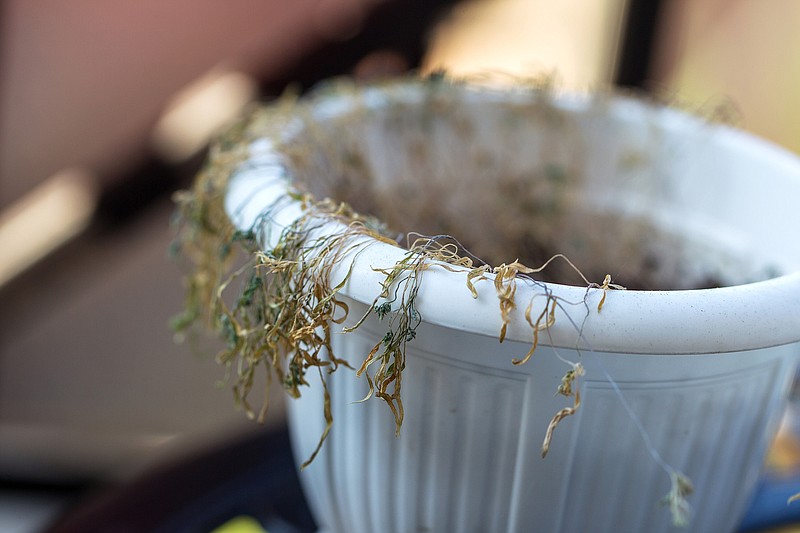I'm not the only one with a brown thumb. However, most people I know don't have an existential crisis about it. But worry plagued me for months as I watched my plants perish. When I told a friend about my inner turmoil, he just laughed. He didn't even notice a tree in his office had died until unswept leaves got in his way.
"It seems to me that of all the things that could set one off, a dead plant ought to rank pretty low," he told me.
And I agree. I didn't expect to hate my houseplants. I thought filling my home with tiny vessels of verdure would create a stress-free sanctuary. At least that's what Instagram and my friends told me.
"But it's different to walk in the park than to try to keep a jade plant alive," said Cheryl Rampage, a psychologist and senior academic and clinical advisor at the Family Institute at Northwestern University. "And being around anything that's dying, that feels like your fault, isn't likely to improve your mood."
After I potted my croton and calathea and a handful of other botanical beauties, I expected instant relaxation. Instead, I felt strained. And that was before plant lives were lost. After awhile, I didn't like how my houseplants made me feel: resentful and disappointed in myself. As someone with a history of anxiety and depression, these are familiar feelings. But not ones I associate with indoor gardening.
"I think, for anybody, it's a buzzkill to watch dying plants. But most people might just toss them away and not worry about them," said Rampage. "But one of the features of anxiety and depression is elevated self-criticism. Everything becomes about you: what you did wrong, what you can't do, what you don't know how to do."
A wave of relief washed over me when my last sickly plant died. I thanked it and buried it outside. It turns out, surrounding myself with visual signs of my ineptness wasn't a great idea.
Don't Try To Be Perfect
While no one likes to be unsuccessful, disappointment can be especially tough if you internalize your failure. If you have anxiety or depression and you are bad at something, whether that's plant parenting or meditation, it "can make you feel less successful in life," Rampage told me.
I also got unreasonably upset when I joined the adult coloring craze. I was terrible at it. But unlike a book of mandalas, I didn't feel like I could just throw out my plants. My love of nature paired with anxiety, which sounds better when I call it self-oriented perfectionism, made it impossible for me to get rid of living things mid-death cycle, even when it was clear I didn't know how to fix the problem.
Getting a plant (or a pet) is sometimes a really good idea. It can give you a chance to think about something other than yourself. This can help some people change their relationship to anxiety and depression, Rampage told me. But these kinds of well-being interventions need to be tailored to the individual, she said.
While Rampage doesn't think I should have given up on my plants immediately, she thinks I should have changed course when it was clear I was destined for defeat.
Garden Beds Have
A Happier Ending
When I moved into a new apartment last year, it came with a small raised garden bed. I decided to buy some starter plants and try outdoor gardening instead. I didn't do much to get things going except pull some weeds and add some top soil and fertilizer.
And like any good plant parent, I left my garden unattended for 35 days.
I fully expected everything to be dead when I came home. But with nature in charge, my plants thrived. My kale, tomatoes and zucchini grew all on their own.
But if you really want
some houseplants
Get something you can forget about for months, like a snake plant, also called mother-in-law's tongue, or a peperomia, the only houseplant I couldn't kill. And learn to care for one plant before buying more.
If your greenery starts to wilt or turn brown, do some research or call your garden-savvy friend before you give up. Your local botanical garden may also be able to help. But if your plant is a lost cause, and it's bumming you out, give it back to the ground.
And buy yourself some cut flowers. They're definitely going to die. But it won't be your fault.

